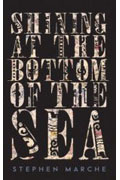
The Morning News Tournament of Books, sponsored by Powell’s Books, is an annual battle royale amongst the top novels in “literary fiction” published throughout the year. Read more about this year’s tournament »
» Buy the Books at Powells.com «
» Meet This Year’s Judges «
» Wager for Charity «
» Relive the Action: ’07, ’06, ’05 «
» Contact the Tournament Staff «
• ROUND TWO • MATCH THREE •
March 21, 2008
 |
Shining at the Bottom of the Seaby STEPHEN MARCHE |

|
| v. | ||
The Brief Wondrous Life of Oscar Waoby JUNOT DÍAZ |
judged by TED GENOWAYS
OK, so I’ll admit that I hadn’t heard of Stephen Marche and hadn’t read his first novel, Raymond and Hannah, so Shining at the Bottom of the Sea was something of a revelation to me. In this little Nabokovian volume, Marche anthologizes the major “fictioneers” of the forgotten (and entirely made up) North Atlantic island of Sanjania. The world feels rich and lived-in, rather than like some curio or, worse, a thinly veiled allegory. And, yet, my sense that Marche wasn’t commenting on anything, was merely inventing for the sake of inventing, was what ultimately made me hesitate to hand him an upset victory. His book suffers by comparison with another recent faux-reference work—Robert Bolaño’s Nazi Literature in the Americas. The Borgesian wildness of Nazi Literature is underpinned by the emerging realization that the imaginary author is a former political prisoner of the real Augusto Pinochet.
And that’s where Junot Díaz edges out Marche. Díaz is mucking around in the same murky waters of nationhood and the sources of literature—but he does it in the person of a “ghettonerd.” Tolkien, Dr. Who, Star Trek, Dungeons & Dragons, comic books—they all go into the blender of Oscar’s mind and come out through the amped-up, slang-wanging Spanglish of the novel’s narrator, Yunior. How these invented realities intertwine with our own is at the heart of Díaz’s narrative and reveal him to be every bit as obsessed with invented identity as Marche, but as with Bolaño the specter lurking behind his tale is a real-life dictator, Rafael Trujillo (“a personaje so outlandish, so perverse, so dreadful that not even a sci-fi writer could have made his ass up”). It gives the novel urgency, potency, and (dare I say?) relevance. It’s enough to make you feel good about what literature can accomplish in the world we all inhabit together.
• About the Judge •
• From the Booth •
| If we’re doing anything here (and I’m not sure we are), it’s showing how biases are not only epidemic, they are unavoidable. | Kevin | John | Being called “Nabokovian” is like crack to many literary authors, sort of the inverse of a standup comedian being called, “Yakov Smirnovian.” |
» Read Kevin Guilfoile & John Warner’s commentary on the match «

» DOWNLOAD THE BRACKETS «
• Round One •
Tree of Smoke v. Ovenman
judged by Tobias Seamon
The Savage Detectives v. Let the Northern Lights Erase Your Name
judged by Elizabeth Kiem
Then We Came to the End v. Petropolis
judged by Anthony Doerr
You Don’t Love Me Yet v. New England White
judged by Jessica Francis Kane
Run v. Shining at the Bottom of the Sea
judged by Kate Schlegel
What the Dead Know v. The Brief Wondrous Life of Oscar Wao
judged by Elizabeth McCracken
On Chesil Beach v. Remainder
judged by Ze Frank
The Shadow Catcher v. An Arsonist’s Guide to Writers’ Homes in New England
judged by Helen DeWitt
• Round Two •
Tree of Smoke v. Let the Northern Lights Erase Your Name
judged by Mark Sarvas
Then We Came to the End v. You Don’t Love Me Yet
judged by Maud Newton
Shining at the Bottom of the Sea v. The Brief Wondrous Life of Oscar Wao
judged by Ted Genoways
Remainder v. The Shadow Catcher
judged by Mark Liberman
• SEMIFINALS •
Tree of Smoke v. Then We Came to the End
judged by Gary Shteyngart
The Brief Wondrous Life of Oscar Wao v. The Shadow Catcher
judged by Nick Hornby
• ZOMBIE ROUND •
Then We Came to the End v. Remainder
judged by Rosecrans Baldwin
The Brief Wondrous Life of Oscar Wao v. The Savage Detectives
judged by Andrew Womack
• FINAL ROUND •
Remainder v. The Brief Wondrous Life of Oscar Wao
All Judges + Jennifer Szalai

